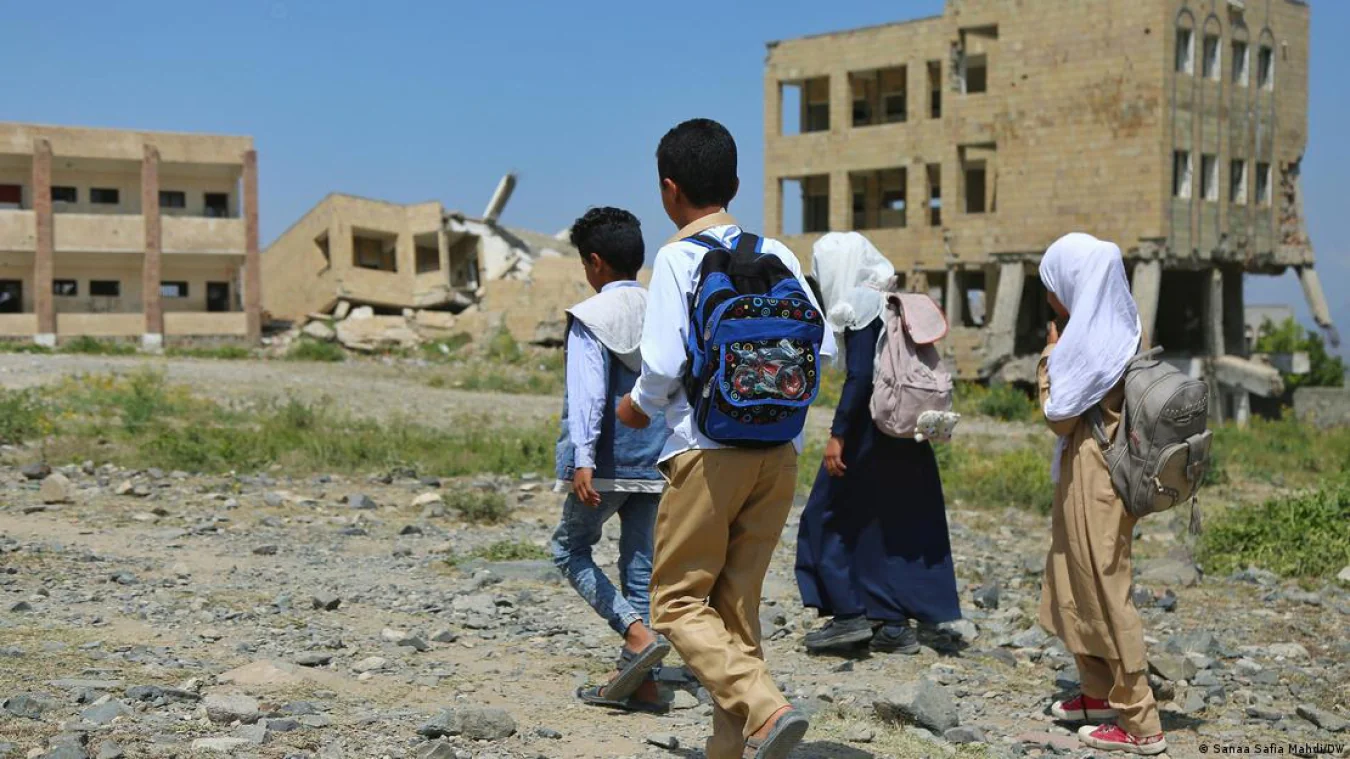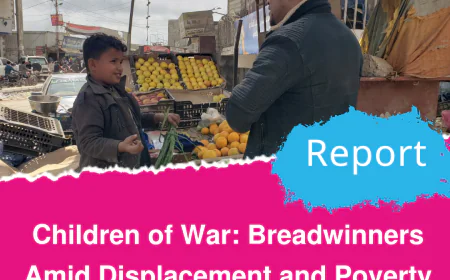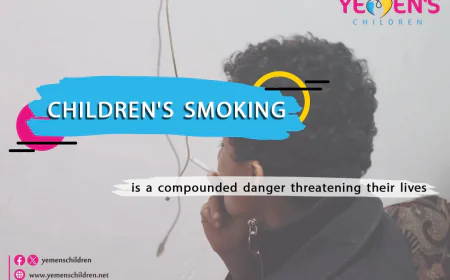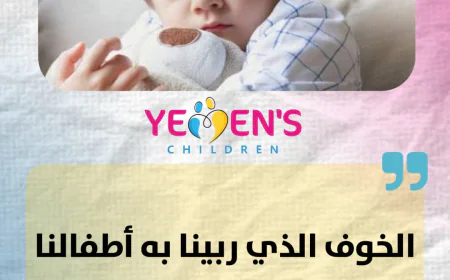Schools in Yemen... traps for recruiting children
Schools in Yemen... traps for recruiting children

yemenschildren Platform: Special Report
Similar to fishing, the Houthi group deploys its supervisors in schools located in areas under its control to hunt school children, take them to training and indoctrination camps, and then throw them on the fighting fronts.
The child, N.A.B. (16 years old), a student in the ninth grade at Al-Mithaq School - Hodeidah Governorate, was one of 16 child students who were forced to go to the fighting fronts by the Houthi supervisor called “Abu Hamza.”
The Yemeni Teachers Syndicate documented the story of this child in its report, “The Unseen Crime,” which monitors the effects of the war on the education sector in Yemen, issued in May 2022.
The following is the story of this child, according to what the union reported in his own words: On the last day of the ninth grade exams for the 2017-2018 academic year, a Houthi supervisor named “Abu Hamza” came to the school (Al-Mithaq), with a group of armed men, and they forced us to hold a protest in the school. .
After completing the event, Abu Hamza and his gunmen took me and 15 children from school to a training camp affiliated with the Houthi group in the Sardoud area. They trained us there for a week and then ordered us to go to our families and bid them farewell, and then they would send us to the front. But I fled to Sanaa for fear of being forced to go with them to the front. When they learned that I had fled, they kidnapped my father to pressure me to go with them to the front, but I refused.”
The Teachers Syndicate did not say what happened next to the child, S.N.B., or what happened to his father after he was kidnapped.
Multiple methods
As of December 2021, the Teachers Union said that it had documented the Houthis’ involvement in recruiting 17,350 students under the age of eighteen, most of whom come from poor and destitute families. The living situation in which they and their families live and their need for money has been exploited as a means to lure them and take them to “death crematoria” on the various fighting fronts, which They do not accept it.
During the period 2015-2022, the human rights monitoring coalition said in its report “Children, Not Soldiers” that it documented 248 incidents of recruitment and exploitation of children in 10 Yemeni governorates: Sana’a, Al-Hudaydah, Amran, Ma’rib, Saada, Dhamar, Ibb, Aden, Hajjah, and Al-Mahwit. .
He concluded that the Houthi group was the most prominent in child recruitment operations, as it recruited 231 children, while other parties to the conflict recruited children at limited levels. The Yemeni government recruited 9, and 8 were recruited by paramilitary formations that are not subject to the authority of the legitimate government.
Regarding recruitment methods, the Human Rights Coalition indicated that 238 children were recruited through intimidating means, and 10 children were recruited through intimidating means. Such as kidnapping and imposing threats on their guardians to recruit them.
Pointing out that the parties to the conflict used many means to influence them, as follows: recruiting 43 children by giving them a salary, 26 were recruited after they participated in cultural courses, 41 were transferred to camps, 8 were recruited without knowing what was wanted from them, 6 were lured into receiving weapons, and 3 were pushed by their families to recruit, 7 were recruited at security points, and 98 are not known for their recruitment motives, but it is believed that many of them were influenced by economic factors or the media and educational curricula.
He explained that recruitment operations increased at a significant rate in 2022, the year in which the Houthi group signed a plan to end child recruitment with the United Nations. The international campaign to end child recruitment was launched by the Yemeni government and the United Nations office in Yemen.
A prominent role for supervisors
According to the Rasd coalition, “supervisors” or “mobilisers” in local communities played a prominent role in exploiting children, and are considered the first hand of the parties responsible for recruitment.
He said that he obtained the names of 143 of these local supervisors, including 140 supervisors affiliated with the Houthi group. Whether they are supervisors of directorates, villages, small population centers, or cooperators. The "supervisor" is considered the controlling authority for the Houthi group in his area.
The human rights coalition identified 13 centers to mobilize and receive child soldiers in Dhamar and Saada governorates alone. He said that these centers are "the first point for training children in weapons and combat culture before sending them to military or security authorities to receive their duties."
In the same context, the Euro-Mediterranean Observatory and SAM documented, in their report “The Militarization of Childhood” issued in February 2021, 11 camps belonging to the Houthi group designated for training children intended to be recruited.
The report explained that 4 of these camps are located in Hodeidah Governorate, while the rest are distributed in other governorates such as Sanaa, Ibb, Dhamar, Saada, and Amran. In it, children receive physical fitness training, the use of light and medium weapons, clearing mines, and throwing bombs and mortar shells.
Dangerous tasks and repercussions
The "Militarization of Childhood" report mentioned 6 tasks carried out by children recruited by the Houthi group: direct combat, guarding checkpoints, collecting information, driving cars, manning supply points, or as escorts to supervisors of the group's leadership.
He listed five effects of recruitment on children: developing a psychological disorder, thinking about suicide, isolation and aggression, bed-wetting, and nightmares in a dream.
A lost childhood
The Yemeni Teachers Syndicate considered the seven years that preceded the issuance of its report to be “50 years for children, due to the horrific violations and suffering they faced that exceeded all expectations and exceeded the limits of reason and logic.”
She said: An entire generation of Yemeni children, in general, faced the threat of death and the severe shortage of food, water, and medical services. Most of them left school voluntarily in search of work or were forced to join the fighting fronts.
She added: Between the roar of planes and the repeated scenes of killing on an almost daily basis, and in front of the barrels of rifles, which did not spare anyone, there is a lost Yemeni childhood that does not know an occasion for joy or amusement or play. She spent her time in fear and panic, moving between cities and villages, searching for a place that would protect her from death and where she could regain even some of what the war had taken from her.
Government and international failure
The Human Rights Monitoring Coalition criticized the role of the Yemeni government and said that it had failed “significantly in developing effective programs to protect children, and had not exercised its duties in re-operating national bodies specialized in child protection.”
It has also "failed so far in creating an effective mechanism at the capital and governorate levels to receive complaints about the exploitation and recruitment of children and to intervene urgently to rescue them."
He pointed to the absence of international accountability mechanisms, and said that this contributed "significantly to the increase in recruitment operations, as the report concluded that the interventions of international organizations, especially those concerned with childhood, did not live up to the required level."
For its part, the Yemeni Teachers Syndicate recommended that the Houthi group "stop recruiting children under the age of 18, and release the recruits after subjecting them to rehabilitation courses and psychological support to ensure their return to education normally."
The union recalled the Yemeni Child Protection Law No. 45 of 2002, which stresses the necessity of not involving children directly in war, and not to recruit anyone under the age of eighteen.











